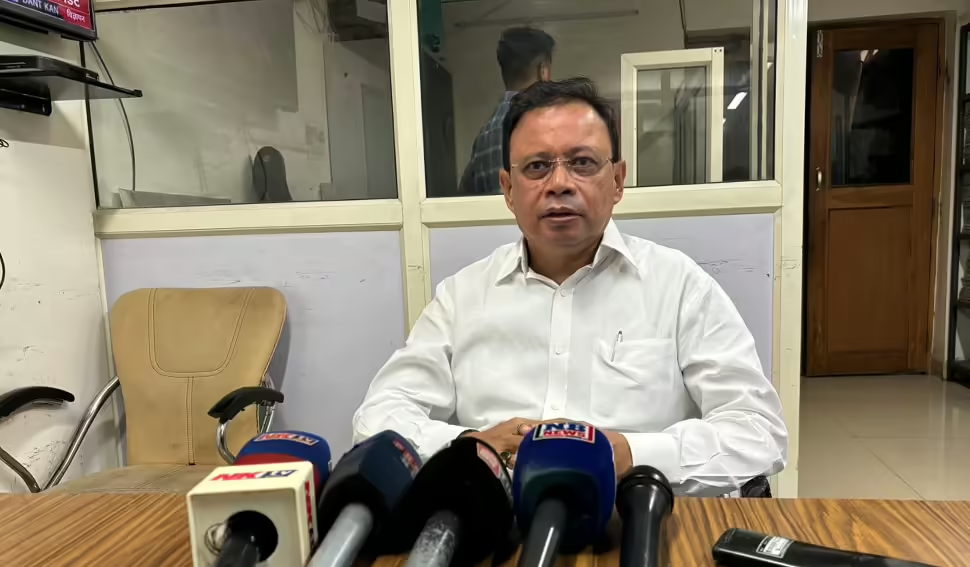Sonapur attack demonstrates increasing confidence of Bangladeshi migrants in Assam: PVM

The anti-influx group Prabajan Virodhi Mancha (PVM) expressed deep concern over the attack by suspected Bangladeshi migrants on police personnel during an eviction drive in the tribal belt of Sonapur and said that the incident demonstrated the increasing confidence and boldness of Bangladeshi migrants in Assam, despite the state being governed by what it referred to as a “so-called indigenous government” for the past eight years.
The eviction drive at Kachutoli under the Sonapur revenue circle in Kamrup metro district on September 12 led to violent clashes, resulting in the deaths of two individuals and injuries to 12 others, including police personnel. The group of alleged encroachers attacked the police and government officials as they carried out the operation, raising alarm about the security and demographic challenges in the region.
Reacting sharply to the incident, PVM convenor and Supreme Court lawyer Upamanyu Hazarika criticized the Assam government’s handling of the eviction drive and the broader issue of illegal immigration. He said that the policy of appeasement towards foreigners, particularly for electoral gains, had encouraged them to the point where they felt empowered to attack police officers, despite being recognized as encroachers on tribal lands.
Hazarika also took issue with Chief Minister Himanta Biswa Sarma’s response to the attack, accusing him of deflecting blame onto the Congress party rather than addressing the actions of the encroachers. He pointed out that Sarma had recently been making pro-indigenous statements and announced the implementation of 57 out of the 67 recommendations made by the Justice Biplab Sarma Committee under Clause 6 of the Assam Accord.
“However, the inconsistency in the Chief Minister’s stance, recalling that just three years earlier, Sarma had dismissed the same committee’s recommendations as unrealistic, even questioning their legal basis,” he said.
According to Hazarika, Sarma’s change in position illustrates his tendency to shift views based on political expediency. He noted that in previous general elections, the BJP’s efforts to attract votes from Bangladeshi Muslim migrants had not been successful, leading to a loss of indigenous support in Upper Assam.
Hazarika raised concerns over the recent surge in policy announcements for the indigenous population in Assam, questioning their actual impact on the ground. He pointed out that while Chief Minister Himanta Biswa Sarma has been making frequent pro-indigenous statements and announcing new measures, the real situation in regions where indigenous people face encroachment tells a different story.
Hazarika cited examples like Sipajhar, Mangaldoi, and Chaygaon, where the indigenous communities are reportedly under threat from encroachers. In Sipajhar, he noted that approximately 77,420 bighas (around 26,000 acres) of land have been encroached upon by people of Bangladeshi origin, with more than 60% of the encroachers not being included in the National Register of Citizens (NRC). After assuming office in 2021, the Chief Minister announced plans to clear the entire encroached land and establish an agricultural project that “would feed all of Guwahati.”
However, Hazarika pointed out that the eviction operations that followed recovered only around 2,000 bighas, and 1,200 families of encroachers were relocated to neighbouring Dalgaon and given land allotments—without proper verification of their citizenship status. This, he argued, reflects the ineffectiveness of the government’s policies and raises questions about the sincerity of the measures intended to protect the indigenous population.
Hazarika continued to criticize the policies and actions of the Assam government, specifically highlighting how the indigenous population remains deprived despite recent initiatives. He pointed out that even after recovering 2,000 bighas of land in Sipajhar, an agricultural and dairy project was started on the land, excluding local communities. Long-time graziers and cowherds, who traditionally grazed their cattle on these lands, were barred from doing so and forced to move to nearby riverine areas. These areas are controlled by encroachers, leading to conflicts. On August 21, 2024, Satya Rajbonshi, president of the Gowal Santha, was physically assaulted in one such area, demonstrating the ongoing tensions.
Hazarika emphasized that despite these conflicts, the remaining 72,000 bighas in Sipajhar are still under encroachment. He also cited the situation in Chaygaon, where the restoration of land due to the Brahmaputra’s changing course has not benefited the original inhabitants. Their land was already encroached upon by Bangladeshi migrants, and despite numerous complaints and protests, authorities have taken no action to restore the land to its rightful owners.
Similarly, in Mangaldoi, an incident on August 24, 2024, where farmer Jiten Deka and his son were assaulted by Bangladeshi-origin shopkeepers in a municipal market, revealed the inaction of local authorities. Despite video evidence, no complaint was filed for 10 days, as it occurred just before the elections when Chief Minister Sarma was seeking votes from Bangladeshi Muslim migrants. This lack of action from the police and municipal board, even after a public crime, further demonstrated the ongoing challenges faced by the indigenous population.
“The plight of the indigenous population in Jakhalabandha, a small town on National Highway 37 near Kaziranga, whose economy heavily depends on the traffic passing through it. The government’s decision to divert the highway for expansion purposes has severely impacted the town. The diversion cuts through agricultural and forest land, bypassing Jakhalabandha and effectively crippling its economy,” he said.
Hazarika further argued that these developments stand in stark contrast to the pro-indigenous rhetoric of Assam Chief Minister Himanta Biswa Sarma. According to Hazarika, the Chief Minister’s recent announcements may be linked to the upcoming Supreme Court judgment on the contentious cut-off date for granting citizenship to migrants from Bangladesh, set at March 25, 1971. The state government has supported maintaining this cut-off date, despite earlier doubts expressed by the Supreme Court regarding its validity. The 1951 vs. 1971 cut-off year is a deeply emotional issue in Assam, and Hazarika suggested that the Chief Minister’s pro-indigenous stance could be an attempt to cushion any potential backlash in the event of a court ruling favouring the 1971 cut-off year.




Leave a Reply